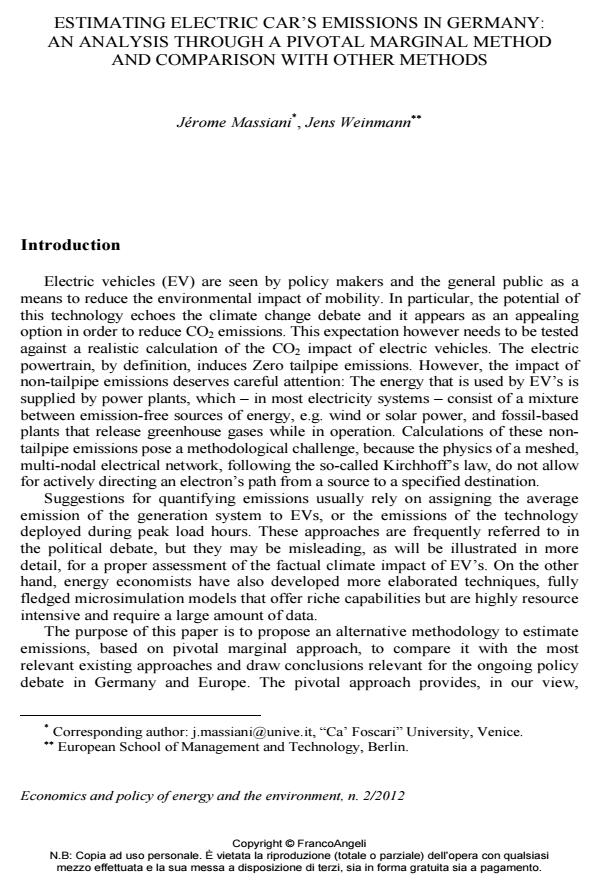Estimating electric car’s emissions in Germany: an analysis through a pivotal marginal method and comparison with other methods
Journal title ECONOMICS AND POLICY OF ENERGY AND THE ENVIRONMENT
Author/s Jérome Massiani, Jens Weinmann
Publishing Year 2012 Issue 2012/2
Language English Pages 25 P. 131-155 File size 788 KB
DOI 10.3280/EFE2012-002007
DOI is like a bar code for intellectual property: to have more infomation
click here
Below, you can see the article first page
If you want to buy this article in PDF format, you can do it, following the instructions to buy download credits

FrancoAngeli is member of Publishers International Linking Association, Inc (PILA), a not-for-profit association which run the CrossRef service enabling links to and from online scholarly content.
In this paper, we estimate the emissions resulting from electric vehicles in Germany. We make use of EMOB, a comprehensive simulation model that provides a forecast and evaluation of the diffusion of alternative fuel vehicles in the next decades. Our method to compute emissions differs from existing ones by a "pivotal marginal" or "hourly marginal" calculation that takes into account the predicted time pattern of EV reloading and can offer a parsimonious alternative to resource intensive micro simulation models. Our approach results in EV emissions of 87 g/km in 2012 and 82 g/km in 2020. These estimates are much higher than those provided by simplified approaches (marginal and average emission) in the short run and get close to marginal emissions after 2035. Co-ordinated charging may reduce the emissions only marginally (usually less than 4 %). Generally, our findings cast doubts on the general claim that electric cars could be fuelled by renewable energy in general, and with fluctuating excess supply of renewables (wind, solar) in particular. This conclusion persists even in the presence of realistic coordination schemes.
Keywords: Electric car, CO2 emissions, Renewable energy, Sustainable mobility
Jel codes: Q42, R42
- The optimal subsidy on electric vehicles in German metropolitan areas: A spatial general equilibrium analysis Georg Hirte, Stefan Tscharaktschiew, in Energy Economics /2013 pp.515
DOI: 10.1016/j.eneco.2013.08.001 - Assessing the Energy Efficiency of an Electric Car František Synák, Matej Kučera, Tomáš Skrúcaný, in Communications - Scientific letters of the University of Zilina /2021 pp.A1
DOI: 10.26552/com.C.2021.1.A1-A13 - Cost-Benefit Analysis of policies for the development of electric vehicles in Germany: Methods and results Jérôme Massiani, in Transport Policy /2015 pp.19
DOI: 10.1016/j.tranpol.2014.10.005 - Total cost of ownership, social lifecycle cost and energy consumption of various automotive technologies in Italy Andrea Rusich, Romeo Danielis, in Research in Transportation Economics /2015 pp.3
DOI: 10.1016/j.retrec.2015.06.002
Jérome Massiani, Jens Weinmann, Estimating electric car’s emissions in Germany: an analysis through a pivotal marginal method and comparison with other methods in "ECONOMICS AND POLICY OF ENERGY AND THE ENVIRONMENT" 2/2012, pp 131-155, DOI: 10.3280/EFE2012-002007